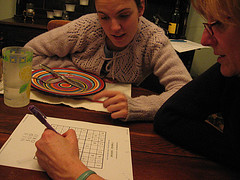 As much as I curse the Information Age for gluing me to a computer screen all day, every day, I must also praise it for democratizing learning. Never before has information been so accessible to those of us lucky enough to live in countries with Internet access. Even those without Internet at home can use it at the local library free of charge and reschool themselves in just about anything. For example, I’ve learned how to play basic guitar largely from Googling guitar chords and pop songs, and I’ve figured out how to build many of the features on my website by searching technology forums. Here are five types of online resources to educate you from the comfort of your couch.
As much as I curse the Information Age for gluing me to a computer screen all day, every day, I must also praise it for democratizing learning. Never before has information been so accessible to those of us lucky enough to live in countries with Internet access. Even those without Internet at home can use it at the local library free of charge and reschool themselves in just about anything. For example, I’ve learned how to play basic guitar largely from Googling guitar chords and pop songs, and I’ve figured out how to build many of the features on my website by searching technology forums. Here are five types of online resources to educate you from the comfort of your couch.
1. How-To and Do-It-Yourself Sites
Instructables shows you how to do just about anything that you can imagine, step by step. Darren, a man’s man who used to plan all his meals around meat, has taught himself to make yogurt and pasta from scratch using Instructables tutorials. Other topics include everything from “How to Pack a Suitcase” to “How to Make a Beanbag Chair.”
Videojug is like the video version of Instructables, with how-to videos on topics like makeup, sports, and even relationships (Check out the helpful “How to Ask a Woman On a Date” and “How to Avoid Trapped Arm Whilst Cuddling in Bed” narrated in a lovely British lilt.) About.com: Video has similar tutorials on everything, like “How to Do the Heimlich Maneuver.”
2. Free and Donation-Based Online Courses
 Universities with the Best Free Online Courses lists ten universities that offer free online courses. In particular, check out MIT’s OpenCourseWare, which publishes “virtually all MIT course content” online. At first glance, “How and Why Machines Work” and “Popular Musics of the World” caught my attention. One reader commented helpfully that if you add “site:edu” to Google searches, you’ll limit your results to university websites.
Universities with the Best Free Online Courses lists ten universities that offer free online courses. In particular, check out MIT’s OpenCourseWare, which publishes “virtually all MIT course content” online. At first glance, “How and Why Machines Work” and “Popular Musics of the World” caught my attention. One reader commented helpfully that if you add “site:edu” to Google searches, you’ll limit your results to university websites.
Discover the .Edu Underground, a post on Lifehacker.com, compiles online educational resources by topic from universities around the world.
The Small Business Administration offers online courses in categories such as Starting a Business, E-Commerce, and Marketing and Advertising.
DailyOm features 8-16 week courses with a suggested, but not obligatory, donation in the $25-40 range. Course topics include “Way of Story Writing” and “Overcoming Self-Sabotage.” Neale Donald Walsch, who wrote the bestselling Conversations with God books, even has one called “Becoming Happier Than God.” Neale, did you learn nothing from the John Lennon “more popular than Jesus” incident?
3. Lectures and Radio Programs
Free podcasts are available through the iTunes store, like Comedy Central stand-up or How Stuff Works (e.g. the Wall Street bailout, cannibalism, and Graceland). Click “Podcast Directory” at the bottom of your iTunes screen to browse. Nerdy or not, I like to load up my iPod with This American Life or Wait, Wait, Don’t Tell Me when I jog or commute.
 iTunesU lets users download “educational content from hundreds of top colleges, universities, and educationally focused organizations across the country.” I recommend Stanford primatologist Robert Sapolsky’s lectures on stress, especially “Why Zebras Don’t Get Ulcers” and “Stress and Coping: What Baboons Can Teach Us.”
iTunesU lets users download “educational content from hundreds of top colleges, universities, and educationally focused organizations across the country.” I recommend Stanford primatologist Robert Sapolsky’s lectures on stress, especially “Why Zebras Don’t Get Ulcers” and “Stress and Coping: What Baboons Can Teach Us.”
TED (Technology, Entertainment, and Design): The TED annual conference “brings together the world’s most fascinating thinkers and doers, who are challenged to give the talk of their lives (in 18 minutes).” The site showcases some of the best lectures online, free of charge. Check out my St. Vincent High School and Santa Clara University classmate Mena Trott talk about “How Blogs Are Building a Friendlier World.”
4. Skills Exchange Sites & Applications
Supercool School is a Facebook application that “allows you to coordinate and hold live and interactive online classes.” You can post a request for a class you’d like to take, or one that you can offer, and Facebook users can sign to teach or take those classes. I haven’t taken one myself, but I’ve seen users all over the world registered for classes like “Why Did the Rwanda Genocide Happen?” and “Beethoven: His Life and Music.”
 TeachStreet.com “connects people who want to learn with people who teach.” Students can search for learning opportunities and find classes in those topics. Teachers can register and advertise the classes they offer. The site has a presence in cities like Seattle, Portland, and San Francisco and is expanding its reach.
TeachStreet.com “connects people who want to learn with people who teach.” Students can search for learning opportunities and find classes in those topics. Teachers can register and advertise the classes they offer. The site has a presence in cities like Seattle, Portland, and San Francisco and is expanding its reach.
TeachMate.org “is a service that helps people who wish to learn things find others who wish to teach them.” Simply fill in “I can learn ___,” “I can teach ___,” and your location, and the site should match you with people in your area who can skills swap with you. Should is the operative word. I have a feeling that TeachMate will be more successful once more people subscribe. So far, I’ve done searches in San Francisco, Sonoma, and Jackson, and they haven’t yielded any results. Anyone want to teach me dance, web skills, or guitar in exchange for Spanish, writing, or cooking?
5. Topic-Specific Blogs
Personal Finance:
 The Simple Dollar and Get Rich Slowly both target readers with average financial knowledge and take a narrative approach to money management. The Consumerist publishes advice on topics such as how to negotiate with credit card companies and how to expedite customer service.
The Simple Dollar and Get Rich Slowly both target readers with average financial knowledge and take a narrative approach to money management. The Consumerist publishes advice on topics such as how to negotiate with credit card companies and how to expedite customer service.
Productivity:
Lifehacker, a site offering “Tips and downloads for getting things done,” teaches you how to “Trim Your Holiday Shopping Costs” or try out “Five Best Desktop Customization Tools.”
43 Folders is a blog with advice for productivity, and solutions to “What sucks for you today?” (your compulsive web browsing, your attention management, etc.)
I tend to get overwhelmed by just how many resources are out there, so Google Reader is a way to keep track of the websites and blogs you follow. Instead of committing to using any of them regularly, you can try out a few and revisit them when inspired. Happy self-educating!
Thanks to Darren Schwindaman for recommending many of these online resources.
*******************************************************
Your Two Cents: Leave a Comment!
What are your favorite educational online resources?
Gotta say I love this post. And the blog. Thanks for the TeachStreet shout out, and for putting all these great online resources in one spot. I think you’re commentary on the democratization of education is really true. It’s one of the greatest things that our friend “the interweb” can do for us.
A few other notes… our friends at Edufire are doing great things in the online learning space, and we love what 43 things is doing for general goal setting and generating mass consciousness around learning new things.
Cheers, Katie Gruver
TeachStreet Community & Operations Manager
Can you hear the giant flushing sound? You’ve just contributed to my spare time being eaten up by using the Internet to re-edumacate myself! I thought I was done for last night when I found the box of college textbooks I’d kept to read, re-read, and use as references in the future. Nope. This post is it.
Personally, I love MyGermanClass.com for learning German, but that’s the only real educational site I’ve actually let myself regularly peruse in the recent past.
There’s a new platform for radio programs called newfiction.com . They do radio plays.